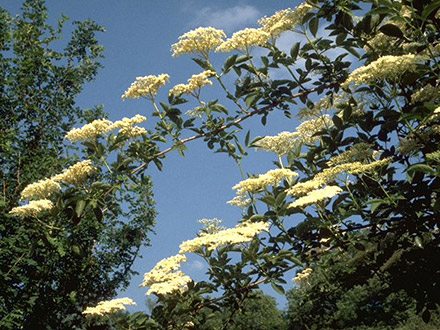Botanical name
Sambucus nigra L.
Family
Viburnaceae
Common name
Elderberry, Black elder, European elder, Black elderberry
Information about the plant
The black elder is distributed across most of Europe, with the exception of the north, and extends as far east as the Caucasus. The shrub, which can grow up to 8m high, with its large pinnate leaves, characterizes the riparian forests and hedgerows in many parts of Germany; it is also common in ruderal meadows and roadsides, railway embankments, and dumps.
Black elder is particularly decorative when it flowers in June and July, as the small, densely clumped white flowers grow in large, umbrella-shaped umbels, 10 to 25 cm in diameter. They are very fragrant and are, therefore, often fermented with water and sugar into sparkling wine or boiled down to syrup. They are also baked into pancakes for their fragrance; the umbels are inserted into the batter and removed after baking. In autumn, the small, black, juicy berry-like drupes can be processed into elderberry juice. They give the elderberry the epithet nigra (Latin "niger" = black). It is unclear whether the genus name comes from the Greek "symbyke" (= harp) or "sambyx" (= red). The exceptionally thick and white pith of the young twigs was previously used in microscopy as an aid for cutting thin objects before the advent of polystyrene.
Medicinally used parts of plants (herbal drug)
The dried flowers are used, which are separated from the dried inflorescences by rubbing (Sambuci flos). Rubbing means that the cones are rubbed over a coarse wire sieve, allowing the small flowers to detach and fall through the sieve.
The commercially available drug is sourced from crops in Germany, Poland, and the Balkan countries.
Constituents of the herbal drug
Black elder flowers contain flavonoids, hydroxycinnamic acid derivatives, triterpenes, gums, and essential oil.
Quality of the drug
The quality of elder flowers (Sambuci flos) is specified in the European Pharmacopoeia (Ph. Eur.).
Medical applications
Recognised medical use
The HMPC has classified elder flowers as a traditional herbal medicinal product (see ‘Traditional use’).
ESCOP: as a diaphoretic for common cold, fever, and chills. These indications are based on human experience and long-standing use.
Traditional use
Elder flowers have been classified by the HMPC as a traditional herbal medicinal product (Article 16a of Directive 2001/83/EC). Based upon long-standing use, black elder flowers can be used to alleviate the first symptoms of a cold.
Herbal drug preparations in finished dosage forms
- Black elder flowers as tea.
- Powdered black elder flowers in coated tablets.
- Alcoholic extracts in drops and juice.
Dosage
Finished medicinal product: see patient information leaflet.
Tea: Drink a cup of black elder flowers tea 2 to 4 times a day, preferably hot (sweating cure), daily dose 10 to 15 g of the drug.
A combination with other drugs is recommended, e.g. lime flowers, meadowsweet flowers, and chamomile flowers (cold tea).
Preparation of a tea
Pour approx. 150 ml of boiling water over 3 to 5 g of black elder flowers and strain after 5 to 10 minutes.
Notes
No safety studies are available on the use of elder flowers during pregnancy and lactation. The use in children under 12 years of age is not recommended due to a lack of evidence.
Side effects
None known
Interactions
None known
References
Herbal drug monographs
HMPC (2018), ESCOP (2014), WHO Vol. 2
Further literature
Commentary on the European Pharmacopoeia (Black elder flowers, No. 1217)


